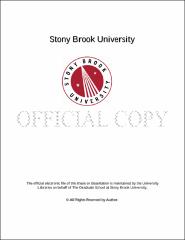| dc.identifier.uri | http://hdl.handle.net/11401/76768 | |
| dc.description.sponsorship | This work is sponsored by the Stony Brook University Graduate School in compliance with the requirements for completion of degree. | en_US |
| dc.format | Monograph | |
| dc.format.medium | Electronic Resource | en_US |
| dc.language.iso | en_US | |
| dc.publisher | The Graduate School, Stony Brook University: Stony Brook, NY. | |
| dc.type | Dissertation | |
| dcterms.abstract | Economic opportunity has long been a topic of interest among students of society and politics, and has made its way back to the forefront of inquiry with the resurgence of levels of inequality beyond those observed during the Gilded Age in the 1920s. Recent studies conducted by The Pew Charitable Trust Mobility Project, as well as others, have revealed that despite Americans’ beliefs in a land of opportunity, the chances to get ahead in life have dwindled for many. However, there is a dearth of information about what members of the public think about their own economic mobility and the effect this has on important political questions, such as preferred levels of redistribution and amount and type of social spending. This dissertation examines the role of mobility in determining attitudes with consideration to aspects of one’s economic environment including the presence of poverty or high inequality. Unlike most of the prior research on social mobility and political attitudes, Studies 1 and 2 rely on panel data to examine actual change in income over time. Study 1 explores the effects of long-term social mobility as well as examines the durability of the effects of economic environment during primary political socialization in adolescence. Study 2 examines short-term mobility during the Great Recession and the effects of experienced economic hardships. Finally, Study 3 expands the scope of the dissertation to a cross-national perspective and explores the relationship between perceived social mobility, attitudes toward the wealthy, and social welfare attitudes in forty-one countries. Ultimately, the dissertation reinforces prior findings that upward mobility is generally associated with political conservatism, but finds that these effects are more modest than might otherwise be expected. Additionally, in terms of relationship between personal economic fortune and political attitudes, it matters more where you are going than where you have been. | |
| dcterms.abstract | Economic opportunity has long been a topic of interest among students of society and politics, and has made its way back to the forefront of inquiry with the resurgence of levels of inequality beyond those observed during the Gilded Age in the 1920s. Recent studies conducted by The Pew Charitable Trust Mobility Project, as well as others, have revealed that despite Americans’ beliefs in a land of opportunity, the chances to get ahead in life have dwindled for many. However, there is a dearth of information about what members of the public think about their own economic mobility and the effect this has on important political questions, such as preferred levels of redistribution and amount and type of social spending. This dissertation examines the role of mobility in determining attitudes with consideration to aspects of one’s economic environment including the presence of poverty or high inequality. Unlike most of the prior research on social mobility and political attitudes, Studies 1 and 2 rely on panel data to examine actual change in income over time. Study 1 explores the effects of long-term social mobility as well as examines the durability of the effects of economic environment during primary political socialization in adolescence. Study 2 examines short-term mobility during the Great Recession and the effects of experienced economic hardships. Finally, Study 3 expands the scope of the dissertation to a cross-national perspective and explores the relationship between perceived social mobility, attitudes toward the wealthy, and social welfare attitudes in forty-one countries. Ultimately, the dissertation reinforces prior findings that upward mobility is generally associated with political conservatism, but finds that these effects are more modest than might otherwise be expected. Additionally, in terms of relationship between personal economic fortune and political attitudes, it matters more where you are going than where you have been. | |
| dcterms.available | 2017-09-20T16:51:09Z | |
| dcterms.contributor | Feldman, Stanley | en_US |
| dcterms.contributor | Kline, Reuben | en_US |
| dcterms.contributor | Barabas, Jason | en_US |
| dcterms.contributor | Schwartz, Michael. | en_US |
| dcterms.creator | Lown, Patrick | |
| dcterms.dateAccepted | 2017-09-20T16:51:09Z | |
| dcterms.dateSubmitted | 2017-09-20T16:51:09Z | |
| dcterms.description | Department of Political Science. | en_US |
| dcterms.extent | 162 pg. | en_US |
| dcterms.format | Application/PDF | en_US |
| dcterms.format | Monograph | |
| dcterms.identifier | http://hdl.handle.net/11401/76768 | |
| dcterms.issued | 2015-12-01 | |
| dcterms.language | en_US | |
| dcterms.provenance | Made available in DSpace on 2017-09-20T16:51:09Z (GMT). No. of bitstreams: 1
Lown_grad.sunysb_0771E_12535.pdf: 2012623 bytes, checksum: 3b1d38f4e4b90c6f6a6ac2ca9c89e3bf (MD5)
Previous issue date: 1 | en |
| dcterms.publisher | The Graduate School, Stony Brook University: Stony Brook, NY. | |
| dcterms.subject | Economic Beliefs, Political socialization, Social Mobility, Social Welfare Politics | |
| dcterms.subject | Political science | |
| dcterms.title | Understanding Social Mobility, Economic Environment, and Their Effects on Social Policy Attitudes | |
| dcterms.type | Dissertation | |

